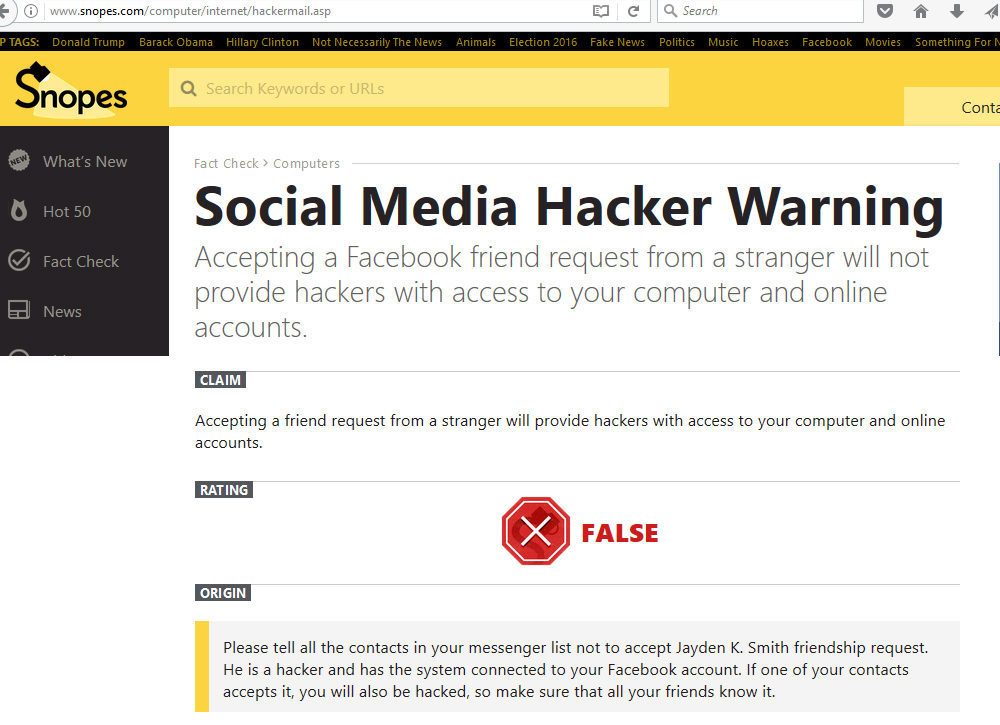Online Threat Warnings - Separate Fact from Fiction
Posted: July 11, 2017

A Facebook warning message has recently been circulating that accepting a friend request from Jayden K. Smith would result in your account being hacked, as well as your contact's accounts. With all the online security threats and creative hackers out there, it may sound legitimate. However, sometimes warnings go viral and are simply not true, causing widespread concern for no reason. It turns out that this particular warning is a hoax, but how do you tell the difference? There's a website that can help you separate fact from fiction.
Snopes.com is a fact-checking and resource website that covers urban legends, Internet rumors, email scams and general misinformation. The team at Snopes.com strives to provide the most transparent information concerning the validity of both old and new warnings and always gives as much detail as they can gather.
You should always follow the recommended safety precautions when it comes to online safety and protecting yourself and your information from threats, but using Snopes.com will provide a little piece of mind when the latest warnings surface, so you know whether you should be concerned, or if it's a hoax you don't need to be concerned about.
We also recommend doing a little research on Facebook friend requests before you accept them.
- First, search your friends list - if you're already friends with someone and you get a friend request from them again, chances are their account has been hacked. Connect with them before accepting the new request. You'll not only keep yourself safe but will also alert them to a potential problem.
- Second, check to see if they have profile information. Someone who sends you a friend request and has no bio, profile picture or other information should be treated with caution.
- Third, do you have any friends in common? A quick click on their name will let you see whether you have any mutual friends, and whether their interests match any of yours.
A little due diligence on everyone's part will help ensure you continue having a safe and secure online experience.
Save
Save
Save
Save
 A Facebook warning message has recently been circulating that accepting a friend request from Jayden K. Smith would result in your account being hacked, as well as your contact's accounts. With all the online security threats and creative hackers out there, it may sound legitimate. However, sometimes warnings go viral and are simply not true, causing widespread concern for no reason. It turns out that this particular warning is a hoax, but how do you tell the difference? There's a website that can help you separate fact from fiction.
Snopes.com is a fact-checking and resource website that covers urban legends, Internet rumors, email scams and general misinformation. The team at Snopes.com strives to provide the most transparent information concerning the validity of both old and new warnings and always gives as much detail as they can gather.
You should always follow the recommended safety precautions when it comes to online safety and protecting yourself and your information from threats, but using Snopes.com will provide a little piece of mind when the latest warnings surface, so you know whether you should be concerned, or if it's a hoax you don't need to be concerned about.
We also recommend doing a little research on Facebook friend requests before you accept them.
A Facebook warning message has recently been circulating that accepting a friend request from Jayden K. Smith would result in your account being hacked, as well as your contact's accounts. With all the online security threats and creative hackers out there, it may sound legitimate. However, sometimes warnings go viral and are simply not true, causing widespread concern for no reason. It turns out that this particular warning is a hoax, but how do you tell the difference? There's a website that can help you separate fact from fiction.
Snopes.com is a fact-checking and resource website that covers urban legends, Internet rumors, email scams and general misinformation. The team at Snopes.com strives to provide the most transparent information concerning the validity of both old and new warnings and always gives as much detail as they can gather.
You should always follow the recommended safety precautions when it comes to online safety and protecting yourself and your information from threats, but using Snopes.com will provide a little piece of mind when the latest warnings surface, so you know whether you should be concerned, or if it's a hoax you don't need to be concerned about.
We also recommend doing a little research on Facebook friend requests before you accept them.